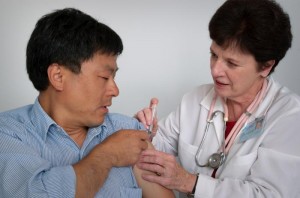Federal health officials are advising travelers to Scotland ensure they are immunized against mumps due to an ongoing outbreak of the viral disease in that country.

On Friday, the Centers for Disease Control and Prevention (CDC) issued a travel notice after reports from Health Protection Scotland say that 242 mumps cases have been confirmed as of March 22. This is an increase from the 45 cases reported during the same period in 2014.
In 2014 there were 286 laboratory-confirmed cases of mumps which is similar to the 239 laboratory-confirmed cases seen in 2013.
Mumps is spread by droplets of saliva or mucus from the mouth, nose, or throat of an infected person, usually when the person coughs, sneezes or talks. Items used by an infected person, such as cups or softdrink cans, can also be contaminated with the virus, which may spread to others if those items are shared.
Symptoms typically appear 16-18 days after infection, but this period can range from 12-25 days after infection. It is usually a mild disease, but can occasionally cause serious complications.
The most common complication is inflammation of the testicles (orchitis) in males who have reached puberty; rarely does this lead to fertility problems. For more infectious disease news and information, visit and “like” the Infectious Disease News Facebook page.
Other rare complications include inflammation of the brain and/or tissue covering the brain and spinal cord (encephalitis/meningitis), inflammation of the ovaries (oophoritis) and/or breasts (mastitis) in females who have reached puberty and deafness. Anyone who is not immune from either previous mumps infection or from vaccination can get mumps.


One thought on “Scotland mumps outbreak prompts travel warning”